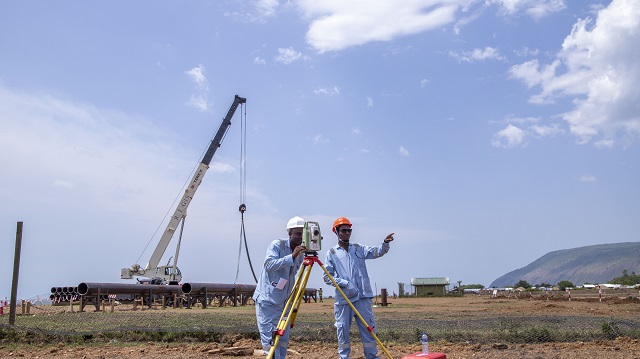
PAU statistics show that more than 11,054 Ugandans are currently employed in the oil and gas sector
Kampala, Uganda | JULIUS BUSINGE | Uganda’s oil and gas sector has employed more than 11,670 people with local citizens taking more than 93% of the jobs at the end of May this year, latest statistics from the Petroleum Authority of Uganda show.
The oil licensees CNOOC and Total Energies directly employed 808, of whom 72% were Ugandans while contractors employed 10,955 of which 96% were Ugandans mainly from the local communities of the oil-rich Albertine Graben.
This was revealed by Peter Kenneth Bintu, the Enterprise Development Officer at PAU during a breakfast meeting titled QHSSE, Labour Skilling and Entrepreneurship, organized by the Uganda Chamber of Mines and Petroleum (UCMP) in Kampala on June 8.
“This means we are making good steps towards achieving our local content goals as a country,” Bintu said.
Sector experts say, ‘local content’ generally refers to the use of domestic suppliers, employment of nationals, and transfer of technology, skills, and know-how from multinationals to domestic suppliers.
Skills Development
Bintu said approximately 11,800 Ugandans have been trained and certified in various oil and gas disciplines of welding, health safety and environment, heavy goods vehicle and scaffolding among others.
Meanwhile, international accreditation and certification of vocational training institutions have seen entities like City & Guilds, ECITB, OPITO, and NEBOSH come on board.
Also, a total of 200 government officers from various ministries and agencies have been trained and equipped with skills in oil and gas and related disciplines. Similarly, more than 2,000 small and medium enterprises (SMEs) have been trained in key oil and gas business requirements.
$1.2bn deals
Over the last five years, approximately 90% of the procurements have gone to Ugandan companies (US$1.2 out of US$1.3), and 20% of this $ 1.2 billion went to Ugandan companies with Ugandan ownership.
Furthermore, approximately 73% of the companies, equivalent to 460 out of 624 companies involved in supplying the sector have been Ugandan companies. More than US$988,650 have been channelled to the community economy in exchange for the provision of goods and services.
Whereas the numbers seem to paint a healthy picture of the sector, Bintu players are experiencing numerous challenges including; inadequate implementation of quality, health, safety, and environment (QHSSE) issues, vandalism, road safety deadlocks, inadequate knowledge of sector standards by employees, skills and training gaps, especially for technical personnel.
Other challenges relate to inadequate standards of services, materials, equipment, and consumables, negative propaganda against the projects, and natural calamities such as floods.
Nevertheless, Bintu said some challenges have been dealt with including conducting road safety awareness campaigns and related risk surveys, inspections, and audits, promotion of national standards and ensuring critical assessment of equipment and materials for the oil and gas sector to conform to the required standards.
Going forward, Bintu advised participants to seek partnerships and act in compliance with the relevant laws and regulations.
He said the PAU would continue working with all stakeholders to ensure compliance with the laws and maximise value retention from Uganda’s oil and gas sector.
“Uganda’s oil and gas sector is continuing to grow with exploration, development, and commercialization projects which are bringing enormous opportunities to benefit Ugandans and the Ugandan economy,” he said.
Humphrey Asiimwe, the Chief Executive Officer at the Uganda Chamber of Mines and Petroleum said the current oil and gas sector benefits have been fuelled by the signing of the Final Investment Decision (FID) in February 2022 that assured the country of investments between US$15-20million in the next five years.
He said the benefits are coming directly from the oil and gas projects but also through linkages with other sectors of the economy like agriculture, manufacturing, and tourism.
“As the Chamber, we are committed to organizing engagements that sector players can use to network and harness opportunities for their businesses and the economy in general,” he said, “All companies intending to benefit from the sector must formalise their operations and avoid shortcuts. As the Chamber we are here to help, our doors are open 24/7.” Uganda hopes to have the first oil in 2024.
 The Independent Uganda: You get the Truth we Pay the Price
The Independent Uganda: You get the Truth we Pay the Price



